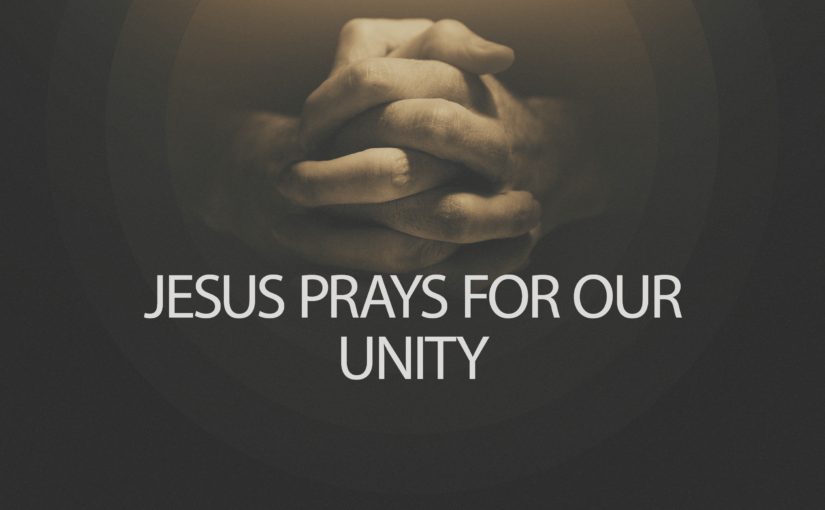“The glory that you have given me I have given them, so that they may be one, as we are one, I in them and you in me, that they may become completely one, so that the world may know that you have sent me and have loved them even as you have loved me.” – John 17:22-23

These words are from Jesus’ prayer for his disciples on the night before he went to the cross. He’s praying for his disciples then, but he’s also praying for those who will believe in him because of them. In other words, he’s praying for his disciples today, too. He’s praying for us.
How comforting it is to know that Jesus is praying for us just as he was praying for them, as anxious as they must have been on that night, their last time all together with him before the cross. And as anxious as we are today, with news of the decline in church membership in the U.S. below 50% for the first time in Gallup’s eighty years of polling, with news of division in our denomination and the launch of the new Global Methodist Church earlier this month, and with the changes taking place here at Keith Church in this season of pastoral transitions. It’s comforting to know Jesus is praying for us now just as he was praying for his disciples then.
There’s a lot of things Jesus prays for in this prayer, his longest recorded prayer in the Gospels. He prays for our protection as we are sent out into the world just as he was sent into the world. He prays for our sanctification in the truth of his word. He prays for our joy. But ultimately this is Jesus’ prayer for our unity – “that they all may be one” (v. 21).
There are three dimensions to this unity in Christ that I want to explore here briefly: the source of this unity (where it comes from), the substance of this unity (what it is), and the purpose of this unity (what it’s for).
First, what is the source of our unity in Christ? Where does it come from? Jesus’ prayer reveals that the source of our unity as disciples in Christ is the oneness that Jesus shares with the Father. This oneness is depicted beautifully in the prayer’s language of reciprocity and mutuality. “As you, Father, are in me and I am in you, may they also be in us…I in them and you in me, that they may become completely one” (v.21, 23). We can sense the intimacy between them in the intimate language of prayer. Perhaps we, too, feel most at one with God in our own times of prayer.
It’s refreshing to remember that the source of our unity is not in ourselves and who we are and our relationships with others, but in God and who God is and in God’s relationship with us in Christ. The source of our unity in Christ is Christ’s unity with the Father.
Second, what is the substance of this unity? What is it? It’s probably easier to start out by saying what it is not. It’s not uniformity. It’s not everyone looking alike, acting alike, worshiping alike. Just look at the Trinity. The Father, Son, and Holy Spirit each have different roles and functions. Their unity is not one of uniformity but of diversity.
Neither is it unanimity. It’s not everyone thinking alike, agreeing on everything. Just look at Jesus’ very first disciples. They were a motley crew. They included a tax collector, someone who worked for the government, but they also included at least one Zealot, a member of a group that sought to overthrow the government, by violent means if necessary. We can well imagine they didn’t agree on everything, or perhaps even much of anything!
The unity for which Jesus prays is a unity in love, a word mentioned five times in the last four verses of this prayer. Especially in the last verse: “I made your name known to them, and I will make it known, so that the love with which you have loved me may be in them, and I in them” (v. 26).
This love for which Jesus prays for us to be united is so much more than a warm fuzzy feeling. It’s a firm commitment to love those who can be tough for us to love, to love when we may not feel like loving, to love even when that love is not reciprocated.
Before Jesus prayed this prayer, he gave his disciples a “new commandment, that you love one another. Just as I have loved you, you also should love one another. By this everyone will know that you are my disciples, if you have love for one another” (John 13:34-35).
Which lead us to our third question: what is the purpose of our unity in Christ? Jesus emphasizes in his prayer that our unity in him is “so that the world may believe that you have sent me” (v. 21). It is “so that the world may know that you have sent me and have loved them even as you have loved me” (v. 23). Our unity in Christ is not for unity’s own sake; it’s not even for our sake; it’s for the sake of the as-yet unbelieving world, so that they may come to believe in him. Our oneness in Christ is a vital part of our witness to the world that might draw them to Christ.
Christ called the church to be different from the world. I worry when the ways of the world – its divisiveness, its polarization – finds its way into the world. That doesn’t attract a skeptical, cynical world to Christ; it repels them. After all, if the church is just as divided and divisive as the world, why would anyone in the world want to be a part of it? Jesus is still praying for the unity of the church for the sake of the world, and it’s obviously a prayer that is yet to be fulfilled.
Again, it’s a unity in love. It’s a unity that conservative biblical commentator William Barclay describes as a unity of the heart. He acknowledges that churches will never organize or worship in exactly the same ways or even believe precisely all the same things. What hinders our unity, he writes, is that we love our doctrines, our rituals, and our creeds more than we love one another.
And yet how does the song we sing go? “They’ll know we are Christians by our…” By our what? By our rules? By our politics? By our social media posts? No, “they’ll know we are Christians by our love.”
I pray that Jesus’ prayer may be fulfilled in each of your lives, in the life of Keith Church, and in the life of the church in the world. I pray that each one of you are one with the source of our unity in Christ, that you know in your own heart and life the love of God in Christ.
And I pray for a spirit of unity in love at Keith Church, a unity that is neither uniformity (after all, we have two different styles of worship services in two different spaces, and maybe having one pastor will help to reinforce that spirit of unity) nor unanimity. One of the great strengths of Keith Church over the years is its diversity. People here see things from all kinds of different perspectives, and I find that very enriching. I learn new things from people who see things differently than I do. And we don’t have to agree with one another to love one another. A colleague told a story this past week about a woman in her congregation who disagreed with another member of her Sunday school class about some issue. The pastor asked her if that meant she didn’t want to do church with that member anymore, and the woman said, “Heavens no! This is my class, those are my people, and I love them.”
And I pray that this spirit of unity in love may draw more people in the Athens community and all across the world to a saving faith in the love of God through Jesus Christ.



